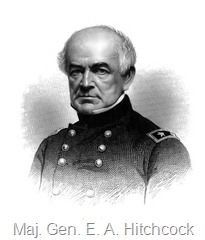June 3.—Major-General Robert W. Lee was assigned to the command of the rebel army in front of Richmond, in consequence of a slight wound to General Johnston, and, upon assuming his important position, issued an address to the army, which was read at the head of the regiments. Its sentiments created the liveliest enthusiasm. The address informed them, in a very few words, that the army had made its last retreat, and that henceforth every man’s watchword must be, “Victory or death!” The response was cheers from all the regiments.—Petersburgh Express, June 5.
—The Twenty-fifth regiment of New-York volunteers, under the command of Col. Bryan, left Albany for the seat of war.—Gen. Hooker made a reconnoissance in force on the Williamsburgh, Va., turnpike, reaching a point within four miles of Richmond. The rebels were not numerous; their pickets were visible, but they fled on the approach of the National troops.
—A letter was published in the Richmond Dispatch, said to have been found in Gen. Casey’s tent at the battle of Fair Oaks. It details a plan for the occupation of the Southern States “after the war.”—(Doc. 130.)
—The sentence of death pronounced on six persons at New Orleans, La., for having violated their parole, was this day commuted by General Butler, who confined them at hard labor on Ship Island, during the pleasure of the President of the United States.
Ethan A. Hitchcock (wikipedia)
After the start of the Civil War, Hitchcock applied to return to the service, but was rejected. It was only after the intervention of his former general, Winfield Scott, that he was commissioned a major general in the U.S. Army and became special adviser to the Secretary of War from February 17, 1862. From March 17 to July 23, 1862, he served as the chairman of the War Board, the organization that assisted President Abraham Lincoln and Secretary of War Edwin M. Stanton in the management of the War Department and the command of the Union armies during the period in which there was no general-in-chief. (Maj. Gen. George B. McClellan had been relieved of his responsibilities as general-in-chief and Maj. Gen. Henry W. Halleck had not yet replaced him.) He sat on the court-martial of Maj. Gen. Fitz John Porter which convicted the general of disobedience and cowardice. From November 1862 through the end of the war, he served as Commissioner for Prisoner of War Exchange, and then Commissary-General of Prisoners until 1867.



